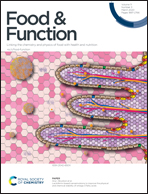Longan pulp polysaccharide protects against cyclophosphamide-induced immunosuppression in mice by promoting intestinal secretory IgA synthesis
Abstract
This study aimed to explore the effect of longan pulp polysaccharide (LP) on the systemic immunity and intestinal mucosal immunity of immunosuppressive mice. The synthesis process and secretion of intestinal secretory IgA (SIgA) were investigated. Results showed that LP increased the thymus index, spleen index, and serum IgA level in cyclophosphamide (CTX)-treated mice. SIgA secretion in the intestinal lumen was increased by LP as well. The underlying mechanism comes down to the facts as follow: LP increased intestinal cytokines expression and TGFβRII that is associated with pathways of IgA class switch recombination (CSR). By improving protein expression of mucosal addressin cell-adhesion molecule-1 (MAdCAM-1) and integrin α4β7, LP was beneficial to gut homing of IgA+ plasma cells. LP increased IgA, polymeric immunoglobulin receptor (pIgR), and secretory component (SC) to fortify the SIgA secretion. This study suggested that moderate consumption of LP is helpful for improving systemic immunity and intestinal mucosal immunity via promotion of intestinal SIgA to strengthen the mucosal barrier.



 Please wait while we load your content...
Please wait while we load your content...